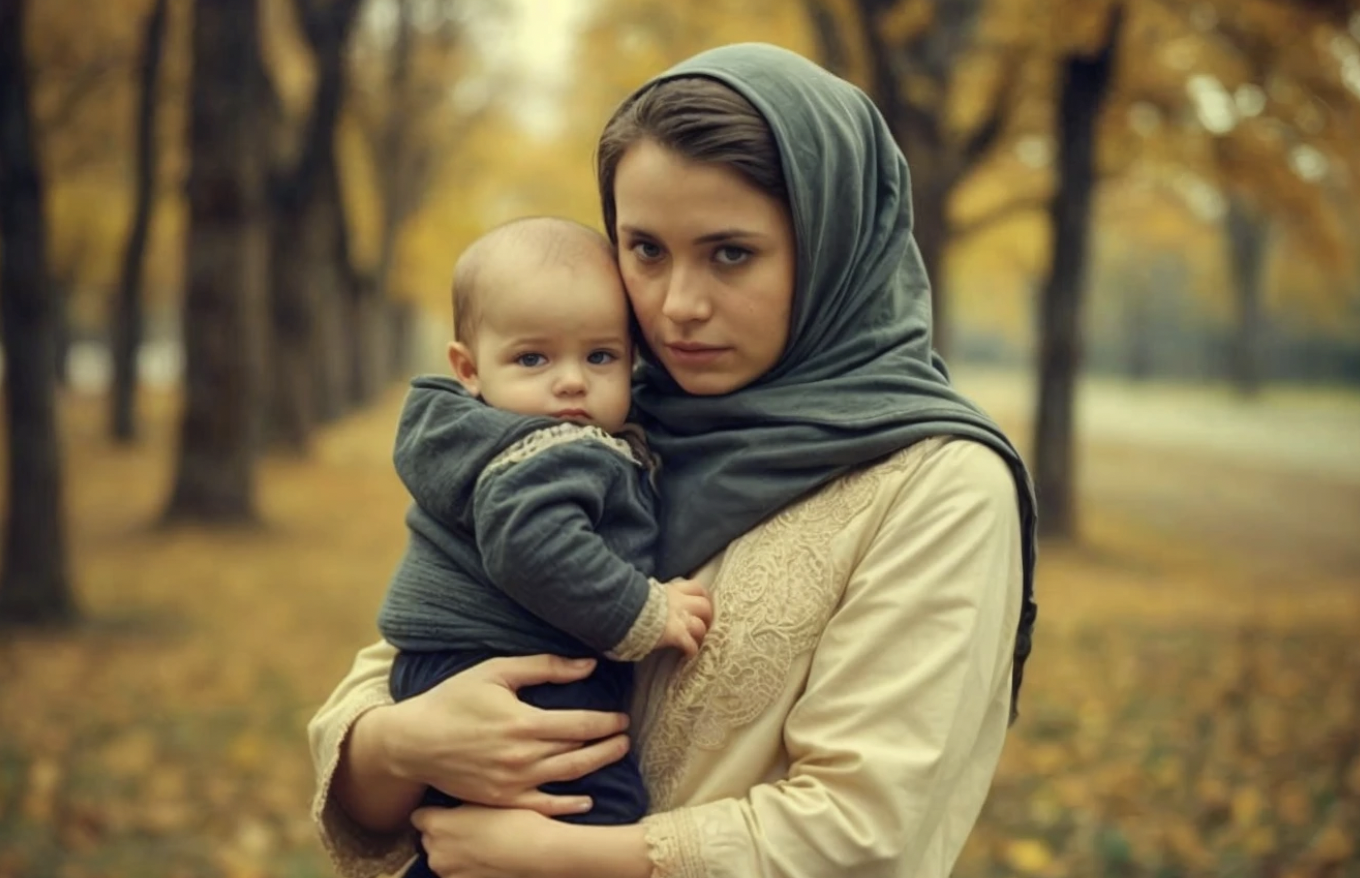— Who’s crying out there? Stepan, can you hear? In such dismal weather, someone is crying!
— Probably it’s just the wind howling, Katyusha. What tears could there be on a night like this…
I ran out onto the porch without even grabbing my scarf. The autumn rain whipped against my cheeks, yet I kept straining my eyes into the darkness.
And suddenly — that sound again. Not the wind, no. Human sobbing, so faint, so vulnerable.
At the bottom step lay a bundle, wrapped in an old scarf. Inside — a child, a boy of about three years old.
His eyes were wide open, yet his gaze was empty. He didn’t blink when I brought my hand to his face.
Stepan came out, silently picked up the bundle with the little one, and carried it inside.
— It’s a divine decree, — he said simply as he set the kettle down. — Let’s keep him.
In the morning, we headed to the district hospital. Doctor Semyon Palych shook his head and sighed heavily:
— He’s blind. Apparently since birth. He doesn’t speak, but he does react to sounds. His development… it’s hard to say. Ekaterina Sergeyevna, you do understand, there are so many children like this in orphanages…
— No, — I replied softly but firmly enough to silence the doctor. — I don’t understand. And I refuse to understand.
Later, we completed the paperwork.
Nina from the village council helped — a distant relative on my mother’s side. They organized everything as an “adoption.” They named him Ilya — in memory of Stepan’s grandfather.
That day we returned home as a family.
— How are we going to manage him? — Stepan stammered, awkwardly holding the little one as I opened the door.
— We’ll manage as best we can. We’ll learn, — I replied, not fully trusting my own words.
I had to leave my job at the school — temporarily, I thought. Ilya required attention every moment.
He did not see danger, didn’t know where the edge of the porch was, where the stove was.
Stepan worked in the logging camps, coming home exhausted, but every evening he would create something for the little one — wooden handrails along the hut’s walls, pegs with ropes in the garden so that Ilya could move around by holding onto the stretched cord.
— Look, Ekaterina, he’s smiling, — Stepan smiled for the first time since Ilya appeared, showing me how the little one was feeling his big, rough hand.
— He recognizes you, — I whispered. — By your hands.
The neighbors split into two groups. Some expressed sympathy, while others condemned. The first group sent children to help, brought milk and eggs. The others whispered on the benches:
— And why do they need him? They’re healthy themselves; they could have their own.
That infuriated me, but Stepan wisely said:
— They don’t know, they don’t understand. We didn’t know either until Ilyusha appeared.
By winter, Ilya began uttering his first words. Slowly, hesitantly:
— Ma-ma.
I froze with a spoonful of porridge in my hand. In that moment, something inside me changed — as if a river that had been flowing in one direction suddenly reversed.
I had never considered myself a mother. A teacher, a wife, a village woman — but not a mother. And now…
In the evenings, when Ilya was falling asleep, I would sit by the stove and re-read old textbooks, trying to figure out how to teach a blind child.
Discoveries came gradually. I guided his hands over objects, naming them.
I let him touch different surfaces — smooth, rough, warm, cold. We listened to the sounds of the village — roosters, cows, the creak of gates.
— Don’t lose heart, — Baba Dunya said as she brought a pail of milk. — God willing, he’ll grow up. After all, blind children… have keener hearing and more sensitive hands. Who knows, he might even surprise everyone.
— I’m not losing heart, — I answered. — It’s just… we don’t know how. Nobody does. We simply love him.
— And that’s all he needs, — the old woman nodded, setting the pail on the table. — Love conquers all.
By spring, Ilya was already following me around the house, holding onto my apron.
He recognized Stepan by his footsteps, reaching out to him.
And when the neighborhood children started coming into our yard, he laughed for the first time upon hearing them play tag.
— Katyusha, — Stepan embraced me, watching as Ilya sat on the porch, listening to the children’s voices. — I’m thinking… it wasn’t we who found him. He found us.
Time passed. Ilya grew up, as all children do — remarkably fast. By the age of seven, he knew our home better than we did.
He could walk from the porch to the shed without ever straying from his path. He recognized the trees in our garden by the texture of their bark. He helped me sort through potatoes, unfailingly picking out the rotten ones.
— This one gives off a different scent, — he explained, setting aside a decaying tuber. — And if you tap it with your nail, the sound is muffled.
Stepan built for him an entire network of guides — pegs of different heights all over the yard, rope paths, handrails.
And I searched for ways to teach him reading.
— How will you learn your letters? — the neighbors wondered. — Perhaps you don’t even need it?
I stayed silent. At night, I would carve letters out of linden wood — three-dimensional, with sharp angles and raised curves. I’d hammer small nails into planks, stretch wire — forming lines. Though very simple, just a couple of words.
Ilya ran his fingers over these homemade symbols, memorizing the shape of each character.
The day he read his first word, Stepan brought an enormous pine board from the forest.
— Let’s make a desk for studying, — he declared, his eyes glowing. — With sides so that the textbooks won’t fall.
Official representatives learned about our Ilya when he turned eight. A commission from the district education department arrived — to check why the child was not attending school.
— Citizen Vorontsova, — began a stout woman in a strict suit, — do you realize that you are breaking the law? A child of school age is obliged to receive an education.
— He is receiving one, — I indicated at our homemade alphabet, the exercise books with pages punctured where Ilya learned to write, pressing the paper.
— But not from professional teachers, — she objected. — In our region there is a specialized boarding school for blind children. There you’ll get professional care, proper methods…
— No, — I felt my face stiffen.
— Think about it, citizen. He isn’t even your blood relative. Why suffer so? They’ll take better care of him there.
I slowly stood up from my seat.
— He’s ours. And he will live a full life, not merely exist.
They left, but I knew — they would return. Stepan was silent for two days, then began building an extra room onto the house.
— For Ilya, — he said as he hammered in the first nail. — His own space. To store his textbooks.
I was allowed to return to teaching at the school, and at home, I was given permission to educate Ilya myself. Every day after classes, we learned together. He absorbed everything instantly.
Sometimes other teachers would come by; we managed to arrange lessons.
— Ekaterina Sergeyevna, — the school principal once said to me, — do you know that your boy… is special?
— I know, — I smiled.
— No, I’m not talking about his blindness. He has an extraordinary memory. And his speech… How does a village child have such a vast vocabulary?
Every evening I read to him. Pushkin, Tolstoy, Chekhov. Stepan brought books from the district library — where Anna Pavlovna worked, who became our protector.
She would set aside the latest books for us, and when the first cassette recorder appeared, she began recording books onto tape.
Ilya listened, memorized, repeated. His speech truly stood out from that of other children — unhurried, thoughtful, as if he tasted every word before speaking.
In the village, everyone got used to him. The children no longer teased him, but ran toward him:
— Ilyukha, come with us! Tell us a story!
He told them fairy tales — both those I had read to him and those he composed himself.
He would sit on a log at the edge of the village, surrounded by wide-eyed village kids. Even adults would stop to listen.
— You know, Stepa, — I said to my husband one evening, — it seems he notices more than we do. Just in a different way.
— He sees with his heart, — Stepan nodded. — And we look with our eyes, yet don’t always truly see.
When Ilya turned seventeen, we sat together on the porch. I was mending Stepan’s shirt,
while Ilya ran his fingers over a book I had specially obtained for him — designed for the blind.
— Mom, — he suddenly said, — I want to write. So that others aren’t afraid.
— Write? — I pricked my finger with a needle. — You want to become an author?
— Yes, — he turned his face toward me. — I want to tell the story of those who can’t see. Yet still perceive the world. About you. About Dad. About everything you have given me.
I looked at his face — lean, with high cheekbones, so reminiscent of Stepan’s, though they were not related by blood. My son. Our son.
— I’ll record every word you say, — I told him, squeezing his hand. — Every single word.
The year 2025. Outside, spring resounded — noisy, ringing, with the cries of jackdaws and the scent of melting earth.
I sit in a wicker chair on the terrace of our new home. Spacious, bright, with wide corridors and no thresholds. A home that Ilya built for us with the royalties from his works.
— Mom, the tea is getting cold, — Ilya sets a new cup before me. Forty-seven years old, yet his movements remain as careful and deliberate as ever.
Now he navigates not only our home — but the entire world.
— I was thinking, — I smile as I take the cup. — I remembered how we started.
Stepan comes out of the garden, leaning on his cane. The years have not been kind to his sturdy back — he had hauled too much lumber, too many boards he had hewed.
— What are you two talking about? — he asks, sitting down beside me.
— About the past, — Ilya answers and laughs. — Mom, you’re lost in your memories again.
— She’s our dreamer, — Stepan takes my hand. His palm still rough, though now marked by age spots.
I look at them — the two most important men in my life — and I cannot believe how much has happened over the years.
After that conversation on the porch, Ilya began dictating stories to me. At first hesitantly, then ever more boldly.
I recorded every word in a thick notebook. When personal computers appeared, we mastered the technology together.
Anna Pavlovna from the library helped us establish contact with the editorial board of a literary publication.
Ilya’s first story was published in 2000. “Listening to the World” — a narrative about a boy who distinguished people by the sound of their steps. Then came a novella, a novel, a collection.
Ilya’s creativity is unique. It tells of people who perceive reality in another way. Of voices, sounds, touches.
Of a light that one can feel on the skin. Of a memory that is more powerful than sight.
Now he has his own studio in a large house — with a computer that voices everything that appears on the screen. With speech recognition programs that capture his words.
Technological innovations have transformed the lives of people like him. But Ilya asserts that the main transformation did not come from the equipment.
— People have started to listen, — he explains to journalists who come for interviews. — They have learned to heed those who are different.
Stepan activates a radio — an old device that we keep like a relic.
— They’ll be talking about our boy again, — he says proudly.
Ilya grimaces:
— Dad, turn it off. It’s awkward to listen to things about yourself.
— But I love it, — Stepan insists stubbornly. — Do you remember, Ekaterina, the first time he said “mom”?
I smile.
— How could I forget… I cried like the last fool back then.
The radio broadcasts news about Ilya Vorontsov’s new novel, which has become a significant event in literature. About his small charitable foundation for blind children.
About how society’s attitude toward people with visual impairments has transformed.
There’s a knock at the door — a new device has been delivered for Ilyusha’s studio. My son goes to answer — confidently, without brushing against the walls. In a house built for him, he needs no guides.
— Imagine, — he returns beaming, — they’ve invited me to join the “People of Light” foundation! They want me to be their representative.
— You’ll go? — Stepan asks.
— I don’t know, — Ilya sits between us. — Only if you come with me. I’m nowhere without you.
The three of us sit on the terrace, listening to spring. I watch my son — tall, a stately man with noble streaks of gray at his temples.
Behind him, my husband — aged, yet as reliable as ever. And I reflect on that rain, on that cry in the night.
I always believed that we gave Ilya life. But with time, I realized — he gave life to us. Filled it with meaning, with a light that cannot be seen but is felt every day. He taught us to notice what others miss. To listen with the heart.
If that October night were to happen again — I would run out onto the porch once more. Barefoot, into the rain. And I would again say: yes. Yes to this fate. Yes to this son. Yes to this life, which turned out to be far richer than I could have dreamed.
— Mom, what are you thinking about? — Ilya touches my hand.
— That you are the best thing that ever happened to us, — I say simply.
— No, — he shakes his head and smiles that special smile I’ve known for many years. — The best thing that happened is us. All of us together.
— Oh, son, there go your wife and daughter! Let’s go meet them.
And now, would you like to know how Ilya perceived everything that was happening? Let’s take a look at the story from his point of view.
My world was always peculiar. Not “dark” — as many believe. Just different, filled with sounds, scents, touches.
My earliest memories are of the warmth of my mother’s hands. Her voice, ringing like a spring brook. My father’s rough fingers, exuding the smell of resin and wood.
I don’t know when I realized I couldn’t see — because I had never seen otherwise. I was five when I first became curious about it.
— Mom, why can’t I see like everyone else?
She froze. I heard her breath catch. Then she took my hands and placed them on her face. — You see in a different way, Ilyusha. With your hands, with your ears, with your heart. Eyes are only one method. You have others.
That day she took me into the garden and let me touch every tree, every bush. “Remember their voices,” she said. — “The birch rustles differently than the aspen. The apple tree smells unlike the cherry.”
The world for me was a symphony of sounds. The creak of the floorboards in the house, which told me exactly where I was. The clatter of dishes in the kitchen. The rustle of pages when mom read to me in the evenings.
When I was six, a neighbor boy named Vovka asked: “And how do you see dreams?” I thought for a long time about how to explain. — In my dreams, I soar. I touch the treetops. I hear the sound of every leaf.
— But what color are they? — he pressed.
— Colors… they have sounds, — I said then. — Yellow rings like a little bell. Red rumbles like a trumpet.
Vovka fell silent. Then he grabbed my hand:
— Come on! I’ll show you something!
He led me to the river. He scooped up water with his hands and let me feel it.
— See how blue it is, — he said. — Like cold water.
Thus began our friendship. And my understanding of colors through touch, sounds, temperature. When it came time to learn, mom created a whole world of embossed letters for me. I would run my fingers over the rough boards for hours, memorizing the shapes. I mastered the alphabet in a week. Reading opened up a whole new universe for me.
— How do you remember so quickly? — mom marveled.
I didn’t know how to explain. To me, each letter had its own character, its own voice. And words came together in melodies I could not forget. At eight, people came who wanted to take me away. I stood by the door, listening as mom argued with them. “He’s ours,” — she said in a way that sent shivers down my spine. — “And he will live only with us.”
Then I realized for the first time — not being able to see in this world means being in danger. They could take you away, separate you, hide you from everyone else. And I also understood that I had protectors. Dad built me a room. I helped him, handing him nails, holding the boards. He never said “be careful” or “don’t touch” — he simply explained:
— Hold the hammer firmly. Strike accurately, without fear.
At twelve, I began to tell stories. First, I retold the ones mom read to me. Then I started inventing my own. — Where do you get these stories from? — the village kids asked, gathering around me.
— Out of thin air, — I laughed. — I hear them whisper.
In truth, the stories were born out of sounds. The creak of a door became the beginning of an adventure.
The sound of rain transformed into a march. The whir of mom’s sewing machine turned in my imagination into the measured clatter of train wheels.
I could almost physically feel how the train carried its characters further and further from familiar places — to where new territories and unknown challenges awaited.
At seventeen, I was struck with the realization — my stories should not vanish into thin air.
They yearned to be set on paper, demanded to exist beyond my voice. I wanted to reveal to people how the world is experienced by one who has never seen it. — You dictate, and I’ll write, — mom simply said when, overcome with emotion, I shared my dream with her. There was not a trace of doubt in her tone, as if she had been waiting for that moment for a long time.
She recorded every word I dictated. Every day after her school classes, she would sit beside her notebook. I heard the scratch of her pen, the rustle of the pages. It was our secret, our ritual. The first story was printed when I was twenty-two. I remember dad reading it aloud — published in a magazine, a real one. His voice trembled with pride.
The surrounding reality transformed around me. Computers appeared, talking programs, e-books. I embraced new technologies, discovered opportunities I never could have dreamed of in my childhood. At thirty, I met Marina — an editor at a publishing house who came to negotiate a new book.
She walked across our yard, and I immediately recognized her footsteps among all the other sounds — light, yet confident, with a distinctive rhythm, as if she were not walking but dancing along the edge of the earth.
And her voice… It interwove notes that touched something deep within me — like a string resonating in unison with my heartbeat.
— Confess, — she said, leafing through the manuscript of my new book, — what’s your secret? Your descriptions are so… tangible. I literally feel everything you write about.
— I perceive the world through other senses, — I answered. — And I translate them into a universal language.
A year later, we married. Two years after that, our daughter Anya was born — with eyes like Marina’s (as mom says), and long fingers like mine (I already know that by touch).
With each new book, the accolades kept coming.
Interviews, travels, meetings with readers. I founded a foundation to support blind children. Together with Marina, we created a small studio — our own little island where books come to life.
We built a home — not just walls and a roof, but an extension of ourselves, with rooms that seem to breathe in rhythm with its inhabitants. In the garden, where I know every bush by its scent, now rest parents whose hands have earned that peace.
On the threshold of forty-seven, I look back and feel like a collector of treasures that money cannot buy — they come only through fate, through encounters, through overcoming challenges.
Not sight — but the ability to perceive the world in layers, in depth. Not an ordinary childhood — but one filled with the love of two people who never let me feel “different.” People often pity the blind. They ask, “How do you cope?” I always answer, “And why should I not cope?”
My world is full of colors — they just have sounds, scents, textures. My world is full of faces — I just feel them with my fingertips.
I did not lose my sight — I found other ways to perceive reality.
And I also found parents who taught me the most important thing: blindness is not an obstacle. The obstacle is fear. And love is stronger than any barrier. Here, on the terrace, between the two dearest breaths, amid the mingling voices of the spring garden, I sometimes feel a strange sensation — as if I see the world more clearly than many who can see, because I have learned to distinguish the essence of things, sifting the chaff of the trivial from the grains of the genuine.
And if you ask me: “Would you like to see as everyone else?” I would answer: “Who said that I see any less?”



